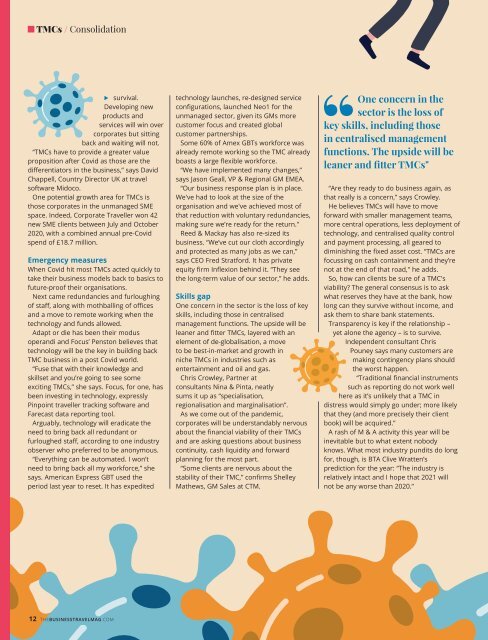Business Travel March-April-2021
Create successful ePaper yourself
Turn your PDF publications into a flip-book with our unique Google optimized e-Paper software.
XXXXXXXXXXXXXXX<br />
TMCs / Consolidation<br />
survival.<br />
Developing new<br />
products and<br />
services will win over<br />
corporates but sitting<br />
back and waiting will not.<br />
“TMCs have to provide a greater value<br />
proposition after Covid as those are the<br />
differentiators in the business,” says David<br />
Chappell, Country Director UK at travel<br />
software Midoco.<br />
One potential growth area for TMCs is<br />
those corporates in the unmanaged SME<br />
space. Indeed, Corporate <strong>Travel</strong>ler won 42<br />
new SME clients between July and October<br />
2020, with a combined annual pre-Covid<br />
spend of £18.7 million.<br />
Emergency measures<br />
When Covid hit most TMCs acted quickly to<br />
take their business models back to basics to<br />
future-proof their organisations.<br />
Next came redundancies and furloughing<br />
of staff, along with mothballing of offices<br />
and a move to remote working when the<br />
technology and funds allowed.<br />
Adapt or die has been their modus<br />
operandi and Focus’ Penston believes that<br />
technology will be the key in building back<br />
TMC business in a post Covid world.<br />
“Fuse that with their knowledge and<br />
skillset and you’re going to see some<br />
exciting TMCs,” she says. Focus, for one, has<br />
been investing in technology, expressly<br />
Pinpoint traveller tracking software and<br />
Farecast data reporting tool.<br />
Arguably, technology will eradicate the<br />
need to bring back all redundant or<br />
furloughed staff, according to one industry<br />
observer who preferred to be anonymous.<br />
“Everything can be automated. I won’t<br />
need to bring back all my workforce,” she<br />
says. American Express GBT used the<br />
period last year to reset. It has expedited<br />
technology launches, re-designed service<br />
configurations, launched Neo1 for the<br />
unmanaged sector, given its GMs more<br />
customer focus and created global<br />
customer partnerships.<br />
Some 60% of Amex GBTs workforce was<br />
already remote working so the TMC already<br />
boasts a large flexible workforce.<br />
“We have implemented many changes,”<br />
says Jason Geall, VP & Regional GM EMEA.<br />
“Our business response plan is in place.<br />
We've had to look at the size of the<br />
organisation and we've achieved most of<br />
that reduction with voluntary redundancies,<br />
making sure we’re ready for the return."<br />
Reed & Mackay has also re-sized its<br />
business. “We’ve cut our cloth accordingly<br />
and protected as many jobs as we can,”<br />
says CEO Fred Stratford. It has private<br />
equity firm Inflexion behind it. “They see<br />
the long-term value of our sector,” he adds.<br />
Skills gap<br />
One concern in the sector is the loss of key<br />
skills, including those in centralised<br />
management functions. The upside will be<br />
leaner and fitter TMCs, layered with an<br />
element of de-globalisation, a move<br />
to be best-in-market and growth in<br />
niche TMCs in industries such as<br />
entertainment and oil and gas.<br />
Chris Crowley, Partner at<br />
consultants Nina & Pinta, neatly<br />
sums it up as “specialisation,<br />
regionalisation and marginalisation”.<br />
As we come out of the pandemic,<br />
corporates will be understandably nervous<br />
about the financial viability of their TMCs<br />
and are asking questions about business<br />
continuity, cash liquidity and forward<br />
planning for the most part.<br />
“Some clients are nervous about the<br />
stability of their TMC,” confirms Shelley<br />
Mathews, GM Sales at CTM.<br />
One concern in the<br />
sector is the loss of<br />
key skills, including those<br />
in centralised management<br />
functions. The upside will be<br />
leaner and fitter TMCs"<br />
“Are they ready to do business again, as<br />
that really is a concern,” says Crowley.<br />
He believes TMCs will have to move<br />
forward with smaller management teams,<br />
more central operations, less deployment of<br />
technology, and centralised quality control<br />
and payment processing, all geared to<br />
diminishing the fixed asset cost. “TMCs are<br />
focussing on cash containment and they’re<br />
not at the end of that road," he adds.<br />
So, how can clients be sure of a TMC's<br />
viability? The general consensus is to ask<br />
what reserves they have at the bank, how<br />
long can they survive without income, and<br />
ask them to share bank statements.<br />
Transparency is key if the relationship –<br />
yet alone the agency – is to survive.<br />
Independent consultant Chris<br />
Pouney says many customers are<br />
making contingency plans should<br />
the worst happen.<br />
“Traditional financial instruments<br />
such as reporting do not work well<br />
here as it’s unlikely that a TMC in<br />
distress would simply go under; more likely<br />
that they (and more precisely their client<br />
book) will be acquired.”<br />
A rash of M & A activity this year will be<br />
inevitable but to what extent nobody<br />
knows. What most industry pundits do long<br />
for, though, is BTA Clive Wratten’s<br />
prediction for the year: “The industry is<br />
relatively intact and I hope that <strong>2021</strong> will<br />
not be any worse than 2020.”<br />
12 THEBUSINESSTRAVELMAG.COM

















